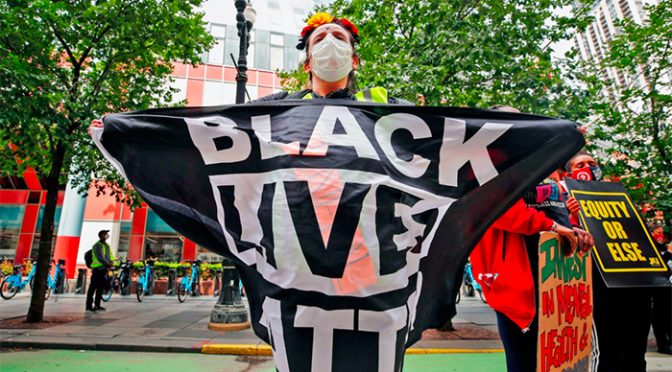
Erika Ayers Badan: You Are The Problem (And The Solution)
This is an episode for people grappling with how to manage and how to embrace AI. Good managers in the future will seamlessly balance being…
Thought Leader: Erika Ayers Badan

After more than two years of disruption, American schoolchildren are finally returning to something approaching normal education — in-person, and without masks or social distancing or other “non-pharmaceutical interventions”. But many of these children are returning transformed. Last week, data from the National Assessment of Educational Progress showed catastrophic learning loss among America’s nine-year-olds, with the worst declines among minority students.
I thought of these children when a friend from Massachusetts complained to me about the Black Lives Matter flag flying outside her son’s school. These flags have become a common sight outside American classrooms since the summer of 2020, and my friend isn’t the only one who’s concerned. The Diocese of Worcester recently ordered a local school to stop identifying itself as Catholic over its refusal to remove BLM and Pride flags, and similar controversies have erupted in Utah and Tennessee.
My friend’s complaint was that BLM is corrupt, which it almost certainly is. Reporting from earlier this year showed that the group’s founder had been spending BLM funds on lavish real estate purchases and payouts to family members. Only last week, Shalomyah Bowers, the leader of the BLM Global Network Foundation, was accused of stealing more than $10 million for personal use.
But complaints over the organisation’s corruption miss the point. Even if BLM were a paragon of transparency, its flag should never have been flown outside an American school — for the simple reason that its core principles are antithetical to a sound education. In other words, it is not a flawed organisation with noble ideals; it is a flawed organisation whose ideals are, at best, misguided and, at worst, actively destructive, with the most disastrous results for black children.
Take BLM’s views on the family. In the guiding principles of its school programme, BLM states that it is “committed to disrupting the Western-prescribed nuclear family structure requirement”. That may seem like an innocuous principle, one that is unremarkable in progressive circles. But in the real world, it is hard to think of a worse idea to teach black kids. As the academics W. Bradford Wilcox and Hal Boyd have noted, the percentage of children in two-parent families in a given community is the “strongest and most robust predictor of economic mobility”. This holds for children of all races, but particularly for minorities. And yet BLM’s manifesto calls for the creation of “black villages” that “collectively care for one another” — even though black boys do much better when their fathers are around.
Even more dangerous to children are BLM’s ideas about a “national defunding of the police”. What does defunding the police mean in practice? The short answer is: more black death. After the murder of George Floyd in 2020, various cities experimented with defunding and otherwise handicapping their police forces, only to find their streets filled with blood. In Oakland, the city planned to slash its police budget in half, until murders nearly doubled from 2019 to 2021 — an extreme version of a pattern that has played out across the United States. Indeed, homicides and shootings spiked across the country in the aftermath of the Floyd riots, driven in part by police demoralisation and in part by “decarceration” policies such as bail reform advocated for by BLM.
Focusing solely on curbing the police also takes much-needed attention away from the suffering inflicted on black children and their families in predominantly black areas where violent crime is rife. Why do we hear so much from BLM and so little from, for example, the organisation Voices of Black Mothers United (VBMU)? VBMU’s website states: “While a black death at the hands of police is the subject of national outrage, the numerous black deaths that occur every day in our communities are ignored. The victims are often children, and their mothers are seldom given a platform to voice their opinions.” And as its Director, Sylvia Bennett-Stone, who lost her own daughter to gun violence in 2004, has said: “It would be devastating to any community to defund or weaken the police force.”
If police presence in black communities is necessary to stop such horrific violence, then why do BLM want to reduce it? The undeniable fact is that black lives matter and police save black lives. And black people seem to agree: while distrust for the police in the black community is high, many black people are staunchly against defunding and are deeply concerned about crime on their streets. In Floyd’s home city of Minneapolis, three-quarters of black residents believe the city shouldn’t reduce its police force.
Add to this the psychological effect of BLM’s catastrophism and it beggars belief that schools think it suitable to fly its flag above their buildings. When young black Americans are told that their country is irredeemably racist, with bigotry baked into its very DNA, then what hope can they possibly have? Never mind the great strides of progress made by black Americans over the past two centuries or so; all of that is a lie, and we are doomed to be subjugated forever — unless you embrace their radical ideology.
Will this really help black children? Or will it teach them nihilism and despondency, and thus become a self-fulfilling prophecy where black people don’t succeed because there’s no point in even trying?
The BLM movement, then, does not represent justice for black Americans; it will not lead to a future of racial harmony. It is the enemy of black prosperity and education. America’s teachers shouldn’t be flying its symbol — they should be using it to illustrate the dangers of divisive racialism. The BLM flag is a red flag: it should be a warning, not an inspiration.
Erika Ayers Badan: You Are The Problem (And The Solution)
This is an episode for people grappling with how to manage and how to embrace AI. Good managers in the future will seamlessly balance being…
Thought Leader: Erika Ayers Badan
Patrick McGee: Tesla’s Robotaxi Bait and Switch
Elon Musk called self-driving cars a ‘solved problem’ 10 years ago. So how come he’s still working on it? In a new column, Patrick McGee…
Thought Leader: Patrick McGee
Mike Pence on U.S. Leadership and Global Strategy
Former Vice President of the United States, Mike Pence, shares his thoughts about President Trump’s framework on trying to acquire Greenland, and discusses what he…
Thought Leader: Mike Pence

